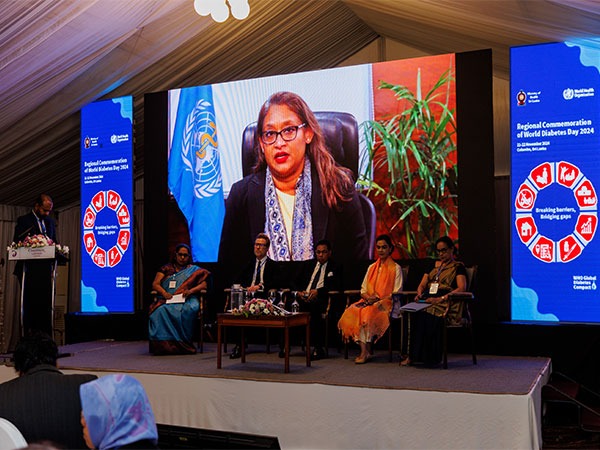Colombo [Sri Lanka]: In an effort to address the rising burden of diabetes, health experts and officials from the World Health Organization (WHO) South-East Asia Region adopted the “Colombo Call to Action,” aimed at enhancing diabetes prevention and management strategies.
The declaration was made during a two-day Regional Commemoration of World Diabetes Day 2024, held under the theme “Breaking Barriers, Bridging Gaps.” Organized by WHO and Sri Lanka’s Ministry of Health, the event saw participation from over 100 stakeholders, including representatives from the WHO regions of South-East Asia, Western Pacific, and Africa, as well as global experts and development partners.
The Colombo Call to Action emphasizes key actions aligned with the WHO Global Diabetes Compact, focusing on uniting efforts, integrating care, innovating solutions, providing treatment, tracking progress, and educating communities. The initiative aims to reduce diabetes risk, ensure access to quality care, and prevent type 2 diabetes linked to obesity, poor diet, and inactivity.
Alarming Diabetes Statistics
The region reports over 482,000 diabetes-related deaths annually, with complications such as blindness, kidney failure, heart attacks, and amputations imposing severe hardships on individuals, families, and health systems.
Saima Wazed, Regional Director for WHO South-East Asia, highlighted the importance of accessible healthcare, stating:
“Bridging the service gaps to ensure timely access to diabetes care can save lives. Care services need to be equitable, comprehensive, accessible, and affordable.”
Strengthening Primary Healthcare
The Call to Action outlines priority measures, including:
- Strengthening primary healthcare to scale up diabetes prevention and control.
- Ensuring access to essential medicines and diagnostics, particularly insulin.
- Integrating diabetes care into broader health programs.
- Promoting healthy lifestyle policies and setting national diabetes coverage targets by 2030.
Global and Regional Efforts
In a video address, WHO Director-General Tedros Adhanom Ghebreyesus noted:
“Over the last three decades, the number of people living with diabetes has quadrupled, now surpassing 800 million globally. More than half of these individuals do not receive treatment. We must intensify efforts to meet global targets and ensure better prevention, diagnosis, and management of diabetes.”
Countries in the region have already made significant progress, with over 60 million individuals placed under protocol-based diabetes and hypertension management as of June 2024. The goal is to reach 100 million by 2025.
Challenges Ahead
Despite progress, challenges persist, such as limited access to insulin for over 260,000 children and adolescents with type 1 diabetes and the rising incidence of type 2 diabetes among young populations.
Commitment from Sri Lanka
Speaking at the event, Hansaka Wijemuni, Deputy Minister of Health and Media, Sri Lanka, reaffirmed the government’s commitment:
“We are dedicated to fighting diabetes through advocacy, health promotion, continuous medicine supply, and universal access to treatment.”
The event concluded with a strong call for collective action. Saima Wazed urged governments, healthcare providers, and communities to work together to ensure equitable, affordable, and high-quality diabetes care.
“The path to overcoming barriers and care gaps is long but achievable. Together, we can ensure healthier and more productive lives for people living with diabetes.”


